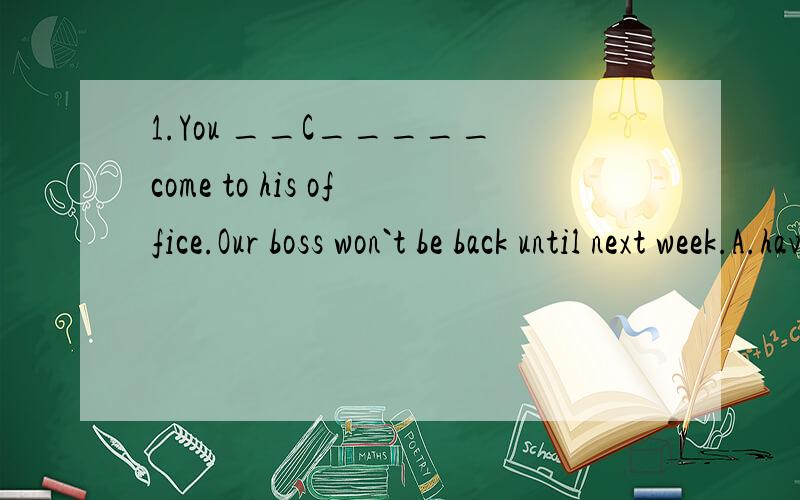1.You __C_____come to his office.Our boss won`t be back until next week.A.haven`t to B.won`t have got toC.haven`t got to D.don`t have got to2.He didn`t expect to have trouble ___C______in that area.A.in getting used to work B.to be used to workingC.g
来源:学生作业帮助网 编辑:作业帮 时间:2024/07/07 17:14:31

1.You __C_____come to his office.Our boss won`t be back until next week.A.haven`t to B.won`t have got toC.haven`t got to D.don`t have got to2.He didn`t expect to have trouble ___C______in that area.A.in getting used to work B.to be used to workingC.g
1.You __C_____come to his office.Our boss won`t be back until next week.
A.haven`t to B.won`t have got to
C.haven`t got to D.don`t have got to
2.He didn`t expect to have trouble ___C______in that area.
A.in getting used to work B.to be used to working
C.getting used to working D.to be used to work
3.More than one answer __B___given to the question
A.have beenB.has been
C.were D.had
1.You __C_____come to his office.Our boss won`t be back until next week.A.haven`t to B.won`t have got toC.haven`t got to D.don`t have got to2.He didn`t expect to have trouble ___C______in that area.A.in getting used to work B.to be used to workingC.g
1.C
have got to do sth=have to do sth 不得不做某事
但是前者视为现在完成时,所以其否定形式是haven't got to do sth
后者视为一般现在时,所以其否定形式是don't have to
2.C
固定短语:have trouble (in) doing sth 做某事有困难,排除BD;
get/be used to (doing) sth 习惯于(做)某事(to是介词),排除A
3.B
more than a/an/one + 名词单数,其意思是“不止一个...”,但其做主语时动词用单数形式,排除AC;
从句意上看,该句为被动语态,故选B(D为过去完成时的主动语态)